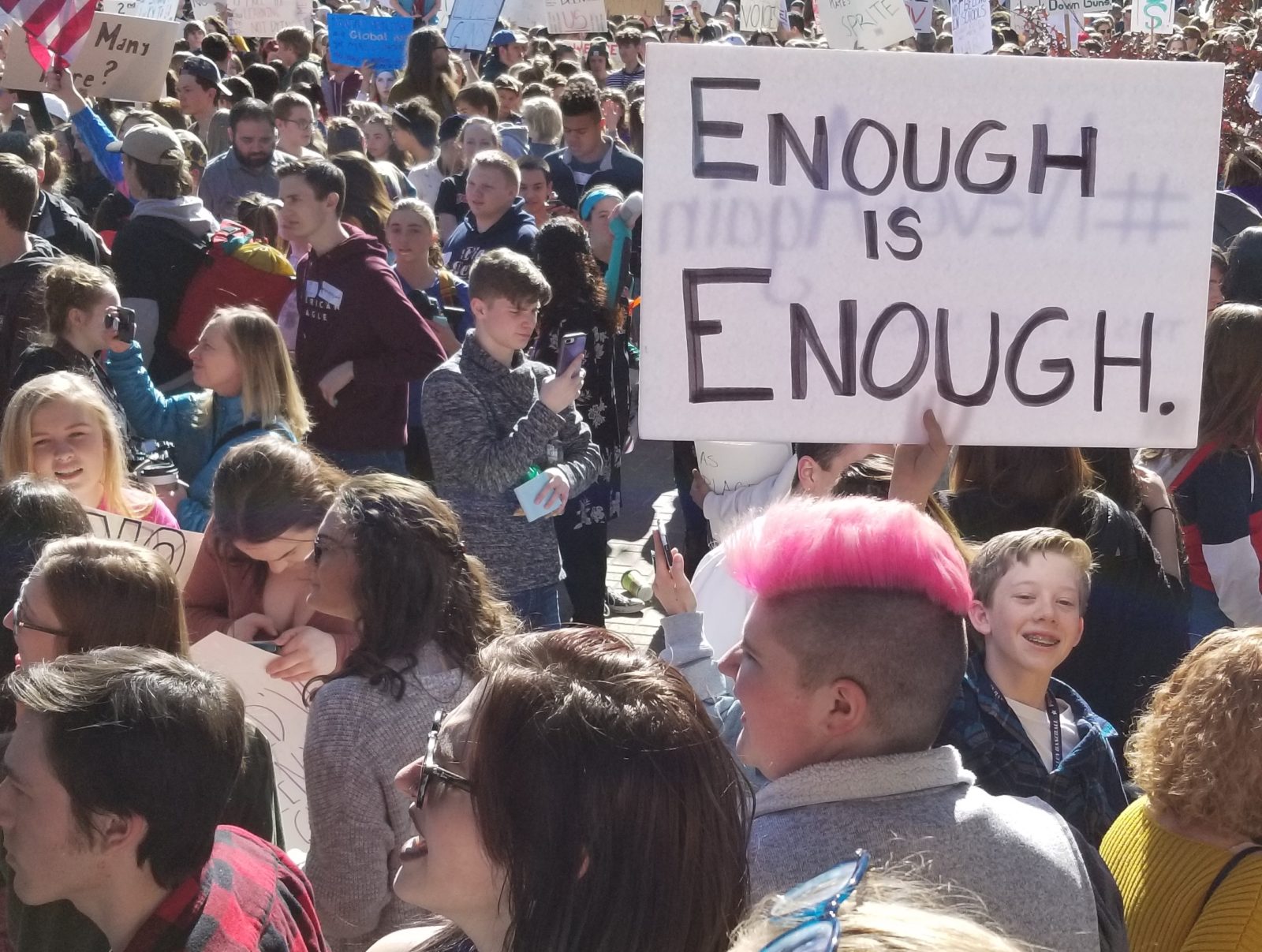The Local newsletter is your free, daily guide to life in Colorado. For locals, by locals.
Nineteen years after the shootings at Columbine High School in Littleton, which left 12 students and one teacher dead, the debate over how to stop mass shootings in schools has finally seemed to hit a tipping point—fueled, in part, by a generation of students that only knows a world where these tragedies routinely take place.
In the wake of the Valentine’s Day shootings at Marjory Stoneman Douglas High School in Parkland, Florida, that left 17 people dead, students across the country are raising their voices to demand change. Locally, Colorado students are joining that call, organizing walkouts and marches even as a surge of copycat threats in Aurora, Greeley, and Woodland Park have threatened school safety.

“We deserve our right to an education and our right to live,” says Allie Holton, a junior at Poudre High School in Fort Collins who helped organize a district-wide walkout that attracted about 1,500 students last week. “We need to open up conversations regardless of political parties, so kids aren’t sitting targets in their schools.”
But at the Colorado State Capitol—where local lawmakers are weighing multiple pieces of legislation—those bipartisan conversations have not yielded any substantial results. In the Democrat-controlled House, Republicans failed to pass three bills to loosen gun restrictions after hours of emotional testimony, including a measure to allow concealed carry of guns in schools. Last week, the Republican-led Senate delayed a vote on a Democrat-backed bill to ban bump stocks, as President Trump took steps to prohibit the devices nationwide. And on Monday, the Colorado Senate advanced a bill allowing gun owners to carry a concealed handgun without a permit on a party-line vote.
But what’s often overlooked in the focus on mass shootings is the everyday experience of attending school for the post-Columbine generation. In the 19 years since this tragedy, more than 150,000 American students have experienced a school shooting, according to a Washington Post analysis. But the ripples of violence extend to all students who feel their safety is in question. “We know what it’s like post-Columbine. We know what it’s like post-Sandy Hook and post-Parkland,” says Holton. “And we know how, slowly, our schools feel less and less safe.”
Holton’s school was in a lockdown drill at 12:40 p.m. on Valentine’s Day—the same time as the Florida shooting. Hiding in closets, with breaking news alerts about an active shooter on their phones, many students thought the drill was real. “That really hit home for me that it can happen to anyone at any time,” she says. The constant vigilance takes a toll. “I’m always looking for an out. If someone were to pull out a gun, where would I go? And if someone were to threaten my life what would I do? I have to think about that every day,” says Holton.

Brooke Giffin, a junior at Polaris Expeditionary Learning School in Fort Collins, attended the walk out last week for her sister, who struggled with mental illness, bought a gun, and took her own life. “I’m really fighting for gun control because I don’t want people who should not have guns to be able to get guns so easily,” she says.
Students from Parker, Highlands Ranch, and Littleton have also staged peaceful walkouts in recent weeks. “What’s important is that we bring love to this topic and not begin to divide over it,” says Addy Cooper, a senior who helped organize a 17-minute walkout at Chaparral High School—one minute for every life lost in Parkland. “We mostly wanted to be out there to show that we should feel safe in a place that we are required to be.”
For years, mass shootings at schools and in movie theaters and nightclubs have resulted in minimal change in laws and regulations. Since the outrage surrounding Parkland, however, many companies have broken ties with the National Rifle Association (NRA), and Dick’s Sporting Goods, Walmart, and Kroeger announced last week they would no longer sell guns to anyone under 21. “We have heard you. The nation has heard you,” DICK’s Chairman and CEO Edward Stack told student activists in a statement.
Public opinion also appears to be shifting. According to a Politico/Morning Consult poll released on February 28, about two in three Americans now say gun control laws should be stricter—the highest level in at least 25 years. Support for gun control measures is stronger after Parkland compared to past shootings, with the biggest increase coming from Republicans and Independents.
Tay Anderson, a freshman at Metro State University, is organizing Denver’s March For Our Lives on March 24—a sister march to the March For Our Lives taking place in Washington D.C. and throughout the country on the same day. The march honors those who have lost their lives in school shootings, and demands that lawmakers bring forward comprehensive gun control legislation. “We are afraid that we won’t ever hear the last bell at the end of the school day,” Anderson says. “No student should have to live in that type of situation.”
Two national school walkouts are also planned on March 14, one month after Parkland, and on April 20—the 19th anniversary of Columbine. “If adults aren’t ready to speak out about this, we have to,” says Cooper. “We know we can’t vote yet. We know our voice isn’t the biggest in the world. But we’ve got people talking.”








